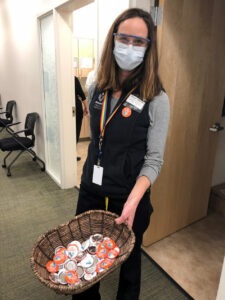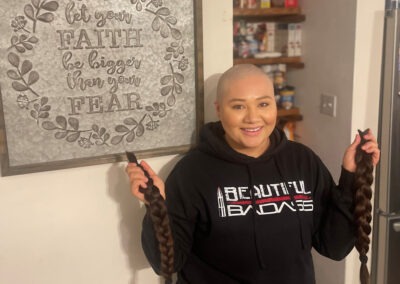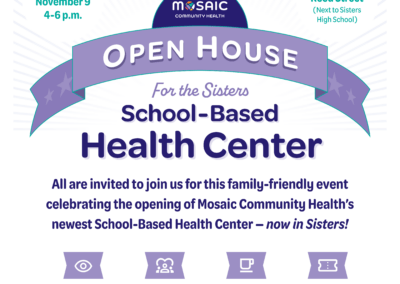Guest blog post on COVID-19 vaccinations by Mosaic pediatric providers Ellie Millan, PNP and Rebecca Hicks, MD, IBCLC
Healthcare providers who work with young children have a great deal of experience communicating with patients and parents about the importance of vaccinations. Long before COVID-19 vaccines made an appearance, pediatric providers were familiar with addressing questions and concerns about routine childhood vaccines. Two of Mosaic’s pediatric providers, who also happen to be moms themselves, share their personal perspective on vaccine hesitancy and offer words of support.
Overcoming “vaccine hesitancy” means choosing hope over fear
by Ellie Millan, PNP
During my nearly ten years of working as a Pediatric Nurse Practitioner I have become well acquainted with the topic of “vaccine hesitancy.” How to approach vaccine hesitant parents was an integral part of my training. I remember shadowing different providers during my master’s program and watching them discuss immunization fears with parents. I absorbed all the information I could in books, lectures, and conferences to feel fully prepared to have these conversations with my own patients. In my first several years of practice I stuck with explaining the science behind vaccines, the data that tells us they are effective and safe, the fact that no other field in pediatrics is more rigorously studied than immunizations.

Ellie Millan, PNP at Mosaic Pediatrics holds a basket of COVID-19 vaccine pins at a recent clinic.
After several unproductive conversations and unconvinced families I decided to change my approach. I realized vaccinations are more often an emotional topic for families. Parents want nothing more than to protect their child from harm and to ensure they will be safe and healthy. What they remember is the scary story of their friend’s child who had an adverse effect, or the fraudulent claims that vaccines cause autism. Instead of pure science, I now discuss the real patients I saw with vaccine preventable diseases when I worked as a RN in the hospital. I talk about the potential impact of these diseases to their young infant, friends who cannot not receive vaccines, or immuno-compromised family members we can help protect getting vaccinated ourselves. We look at pictures of vaccine preventable diseases in the exam room. I reassure them that both of my children have received every vaccine on schedule as recommended by the Advisory Committee on Immunizations Practices (ACIP) and American Academy of Pediatricians (AAP), and that I would never recommend something for their child that I do not do for my own children.
Our most monumental achievement is also a significant barrier
Our most monumental achievement in science is also our most significant barrier in discussing vaccines with patients and families: the current generation of caregivers making decisions about vaccines for their children have not lived through an era of vaccine preventable disease. It is BECAUSE of vaccinations that they do not have emotional memories of watching a family member die from measles, or become debilitated by polio, or suffer permanent hearing loss from meningitis. Medical providers are not only unique in our knowledge about infectious diseases and vaccine safety and efficacy thanks to our training, but also in our memory of seeing these illnesses firsthand. We often come from an impassioned perspective when remembering past patients who have suffered or died from a vaccine preventable disease.
Many of us have not experienced a vaccine preventable pandemic until now. Our current moment with the COVID-19 vaccines is historic for many reasons, but most notably for me is that we have witnessed first hand the devastating toll this virus has taken on our global community in the last 11 months, and are now being offered a safe path back to normalcy. No one has been untouched by COVID-19, even if their greatest loss was the ability to eat out at a restaurant. Most of us have endured the hardest year of our lives. In fact, I think of it as a modern world war given the sacrifices we have made and the lives we have lost. But now thanks to science we are being offered a chance at hope.
Choose hope over fear
For me, this vaccine means that I will not suffer or die from COVID-19, that my daughter can continue to attend kindergarten in person, and that I could have a dinner party with my extended family whom I have missed so dearly this past year. My 91-year-old grandmother moved to Bend in October, but I’ve been unable to give her a hug or sit in a room with her and enjoy having her so close to me. These are just a few things I look forward to, but for these dreams to become reality we need people to get vaccinated, we need them to choose hope and not fear.
COVID-19 vaccines offer hope
By Rebecca Hicks, MD and IBCLC
Over the last 14 years, I have spent many hours studying, contemplating and discussing vaccine science, but I can’t recall a time when I felt as much excitement or hope about a particular vaccine as what I feel now about the COVID-19 vaccines that have been authorized in the US.

Rebecca Hicks, MD, IBCLC and Mosaic pediatric provider
As a pediatrician, and as a member of an international COVID-19 committee, I have been following the studies and news on COVID-19 vaccines around the world very closely. Back in December, when I finished reading the 67 page long FDA report on the Pfizer vaccine results, I felt something that I hadn’t felt in many months…hope.
A reminder of the past
In that moment, I was reminded of a story from my medical training. The story was about a vaccine scientist in the 1950’s who was the first person to read the results of the polio vaccine trials taking place in America amidst a deadly polio epidemic. As the story goes, this scientist held the paper in shaking hands with tears of happiness streaming down his face as he saw the results. Of the many thousands of children in this trial, 30 children had succumbed to a fatal polio illness during the study, and all of them were in the placebo group that did not receive a vaccine. Not a single case of polio occurred in the group of children who had received vaccinations. This man was moved to tears because based on these results, he knew the polio vaccine worked and that the epidemic would come to an end, ridding the country of this tragic disease.
This is how I felt when I saw the results of the Pfizer vaccine trial and again with the Moderna vaccine weeks later, filled with confidence and hope. Like the polio vaccine, these COVID vaccines work fantastically well to prevent COVID-19 disease and are our best possible chance of moving out of the pandemic.
These vaccines were given to tens of thousands of volunteers during the trials and now have been given to millions of people around the world. Many robust safety monitoring systems are in place and through the data generated from these systems, I can say confidently that these vaccines are proving themselves to be very safe.
Getting the COVID-19 vaccine is the smart choice
There is nothing in medicine that is completely risk free, and when millions and millions are receiving a vaccine (any vaccine), a small number will have an adverse effect from it. But the chances of having a bad outcome from one of these COVID vaccines are exceedingly small and certainly much smaller than the chances of having a bad outcome from COVID-19 disease.
When it is your turn and the vaccine becomes available to you, I want you to know that getting the COVID-19 vaccine is the smart choice. I am thrilled to be fully vaccinated against COVID-19 and am hopeful that as many others become vaccinated, we will rid our country of this tragic disease and regain a sense of normalcy that we all deserve.
Another personal perspective from a Mosaic provider
A guest column by Brian Sullivan, MD appeared in a recent issue of the Bend Bulletin. Brian is the Clinic Medical Director for our Redmond clinic. In this moving piece, Brian shares his thoughts on receiving the COVID-19 vaccination, and his gratitude to all that made it possible. Read the column here.
COVID-19 presentations by Mosaic providers
Do you have questions about the COVID-19 vaccine? Mosaic’s Director of Pharmacy services, Dr. Albert Noyes, has taken a close look at the science behind the vaccines and developed a presentation for the public. This video will help you learn how the vaccines work, explore common reactions and learn about what you can do if you have allergies or other concerns. Dr. Kim Montee also provided a video of this presentation in Spanish. Both videos can be viewed here.



0 Comments